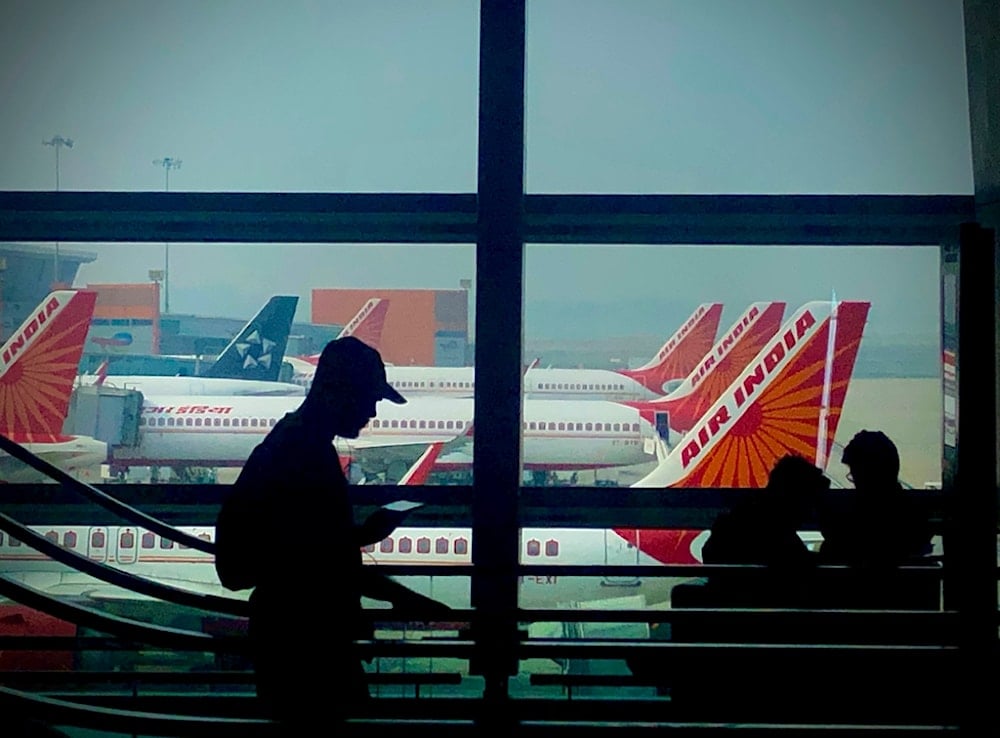Air India seeks compensation over Pakistan airspace ban
Air India has requested government compensation after estimating $600 million in losses due to Pakistan's airspace closure.
-

A man is silhouetted against an airport window with Air India aircraft parked in the background in New Delhi, India, October 31, 2023. (AP)
Air India has formally requested compensation from the Indian government, projecting losses of nearly $600 million if Pakistan’s airspace ban remains in effect for a full year, Reuters reported on Thursday.
The airline made the appeal in a letter dated April 27, reviewed by Reuters, outlining the serious operational and financial impact of the closure.
The ban, imposed by Islamabad due to a dispute with New Delhi over a recent attack on tourists in the Indian-administered Kashmir region, has forced Indian carriers to reroute long-haul flights, leading to significant fuel and crew-related expenses.
India has accused Pakistan of backing the deadliest attack in years on civilians in Kashmir on April 22, in which 26 men were killed.
Islamabad has rejected the charge, and both countries have since exchanged gunfire in Kashmir, diplomatic barbs, expelled citizens, and ordered the border shut.
Pakistan closed its airspace to Indian aircraft on April 24, while India took a similar measure on Wednesday evening, with the ban to last until May 23.
Read more: Pakistan accuses India of planning 'military strike' soon
Air India requests government support amid soaring operational costs
In its letter to the Ministry of Civil Aviation, Air India proposed a "subsidy model" to reflect the scale of the financial strain. The airline warned that annual losses could exceed 50 billion Indian rupees (approximately $591 million) if the restrictions persist.
"Subsidy for affected international flights is a good, verifiable and fair option ... the subsidy can be removed when the situation improves," the letter explained.
"The impact on Air India is maximum due to airspace closure, due to additional fuel burn...additional crew."
This Air India compensation request came in response to a government inquiry seeking assessments of the airspace ban’s impact on the sector.
Pakistan airspace closure disrupts long-haul routes
Reuters pointed out that the Pakistan airspace closure impact is particularly severe for Air India, which operates an extensive network of long-haul flights to Europe, the United States, and Canada. These routes traditionally pass through Pakistani airspace.
Data from Cirium Ascend show that in April, Air India, its low-cost subsidiary Air India Express, and IndiGo scheduled around 1,200 flights from New Delhi to Europe, North America, and the Middle East. Air India's share of international operations far exceeds its domestic competitors, intensifying its exposure to airspace restrictions.
Indian government considers relief measures for airlines
The news agency cited sources familiar with the matter as saying that the Indian government is evaluating several responses, including possible tax exemptions and alternative routing over difficult terrain near China.
Air India also urged the government to engage with Chinese authorities to secure limited overflight permissions, though the letter did not provide further specifics. The airline additionally requested approval to carry extra pilots on flights to the US and Canada to accommodate longer travel times due to rerouting.
Transformation plans face headwinds under Tata Group
Reuters highlighted that the airspace ban is a fresh setback to Air India’s ambitious recovery strategy under the Tata Group. The airline, which returned to private ownership as part of a multi-billion-dollar transformation, has already been struggling with aircraft delivery delays from Boeing and Airbus.
In the 2023–2024 fiscal year, the carrier reported a net loss of $520 million on revenues of $4.6 billion. Despite holding a 26.5% share of the domestic aviation market, Air India flight delays and costs related to international operations have added pressure on its revival plan.
Read more: India’s military arsenal vs. Pakistan’s first-use nuclear policy

 4 Min Read
4 Min Read








